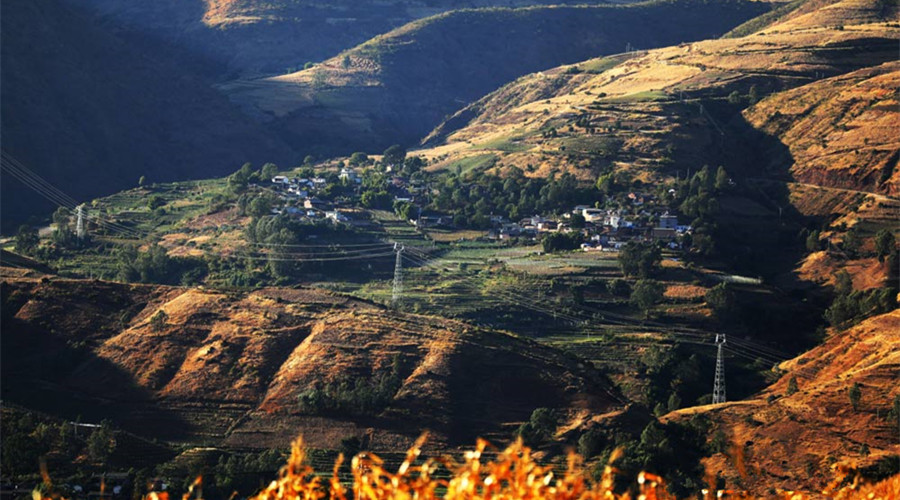
Zhukula Coffee in Bingchuan County, Dali
Zhukula Coffee in Bingchuan County, Dali(宾川朱苦拉咖啡) is from Zhukula Village in Binchuan County of Dali. Zhukula(朱苦拉) is a word in Yi language and literally means “winding paths”. Located in Pingchuan Township, west Yunnan’s Bingchuan County, the Zhukula Village is 600 kilometers away from Kunming.
Historical Origin
The history of coffee cultivation in Zhukula Village, Binchuan County, Yunnan Province, dates back over one hundred years. The introduction of coffee to Zhukula began in 1904 when French Catholic missionary Tian De Neng brought Vietnamese coffee seeds to the village. Since then, the villagers have developed a tradition of planting and drinking coffee. Today, Zhukula Village boasts 1,134 ancient coffee trees, with 24 of them over 100 years old, making it the origin of Chinese coffee. The villagers have preserved traditional methods of coffee processing, including picking, drying, and shelling, which are considered the most complete preservation of coffee culture in China.
Habitat Environment
Zhukula Village is located in Binchuan County, Dali, Yunnan Province, in the transition zone between the Central Yunnan Plateau and the West Yunnan Mountains. Positioned in the hot valley on the south bank of the Jinsha River, the area spans coordinates 25°32′—26°12′N and 100°16′—100°59′E. It is bordered to the east by Dayao County, Chuxiong Yi Autonomous Prefecture, and to the west by Eryuan County, Dali. The land area covers 2,562.67 square kilometers, with mountains accounting for 83.34% and dam areas 16.66%. The primary rivers include the Naxi River, Pingchuan River, Duobeijing River, and Qingshui River, all of which flow into the Jinsha River. The main tributary length is 304.6 kilometers, with a drainage area of 2,518.56 square kilometers.
Products Features
Zhukula Coffee is known for its thick yet non-bitter flavor, fragrant aroma without being greasy, and a slight fruity sourness. The ancient coffee forest in Zhukula is unique, being the only agricultural form in China and even the world that was introduced to a barren, dry, and hot valley and has been cultivated for over 100 years. In 1981, Professor Ma Xijin, a tropical crop expert, confirmed that Zhukula Coffee belongs to Yunnan Arabica Coffee, specifically the oldest and purest Bourbon Tepika breed. It features Tepika varieties (31% of red-top plants) and Bourbon varieties (69% of green-top plants).
Production Situation
As of 2012, Zhukula Coffee was cultivated in six local villages with an annual production of nearly 14 tons, yielding an average income of over 7,000 yuan. By 2017, the coffee planting area in Binchuan County had expanded to over 8,000 acres.
Zhukula Coffee Museum
To celebrate and share the rich history of Zhukula Coffee, the Yunnan Provincial Museum opened the Hundred-Year-Old Zhukula Coffee Museum in Kunming on September 6. This museum showcases the story of Zhukula Coffee and includes a café for visitors to enjoy the historic brew. The museum is open from Tuesday to Sunday every week.
As a Coffee Lover
If you are passionate about coffee, don’t miss the chance to taste the oldest coffee in Chinese Mainland—Zhukula Coffee. Visit the museum to explore its storied past and savor a cup of this unique and historic coffee.
How to Get to Zhukula Coffee in Bingchuan County, Dali
To visit Zhukula Coffee in Binchuan County, Dali, follow these directions:
Getting to Binchuan County:
- By Air:
- Fly to Dali Airport (DLU):
- Book a flight to Dali Airport, which is the nearest major airport to Binchuan County.
- From Dali Airport, you can take a taxi or a bus to Binchuan County. The drive from Dali Airport to Binchuan takes approximately 1.5 to 2 hours (around 80-100 kilometers).
- Fly to Dali Airport (DLU):
- By Train:
- Take a Train to Dali:
- You can take a train to Dali Railway Station from major cities like Kunming or Chengdu.
- From Dali Railway Station, you can take a taxi or a bus to Binchuan County.
- Take a Train to Dali:
- By Bus:
- Bus from Kunming:
- Buses to Binchuan County are available from Kunming’s main bus station. The bus ride usually takes around 3 to 4 hours.
- Bus from Kunming:
Traveling to Zhukula Village:
- From Binchuan County to Zhukula Village:
- By Taxi:
- The most convenient way is to hire a taxi or private car from Binchuan County to Zhukula Village. The journey takes approximately 30-45 minutes (around 20-30 kilometers).
- By Local Bus:
- You can inquire about local bus routes or mini-buses that run between Binchuan County and Zhukula Village at the Binchuan County bus station. Be sure to check the bus schedules in advance.
- By Taxi:
Tips:
- Language: English is not widely spoken, so it’s helpful to have your destination written in Chinese characters.
- Navigation: Using a map app with GPS can help you navigate from Binchuan County to Zhukula Village.
- Local Information: It might be useful to contact local tourism offices or guides in Binchuan for up-to-date transportation options and assistance.
Feel free to reach out if you need further assistance with your trip!

 7 Days GolfingTour
7 Days GolfingTour
 8 Days Group Tour
8 Days Group Tour
 8 Days Yunnan Tour
8 Days Yunnan Tour
 7 Days Shangri La Hiking
7 Days Shangri La Hiking
 11 Days Yunnan Tour
11 Days Yunnan Tour
 6 Days Yuanyang Terraces
6 Days Yuanyang Terraces
 11 Days Yunnan Tour
11 Days Yunnan Tour
 8 Days South Yunnan
8 Days South Yunnan
 7 Days Tea Tour
7 Days Tea Tour
 8 Days Muslim Tour
8 Days Muslim Tour
 12 Days Self-Driving
12 Days Self-Driving
 4 Days Haba Climbing
4 Days Haba Climbing
 Tiger Leaping Gorge
Tiger Leaping Gorge
 Stone Forest
Stone Forest
 Yunnan-Tibet
Yunnan-Tibet
 Hani Rice Terraces
Hani Rice Terraces
 Kunming
Kunming
 Lijiang
Lijiang
 Shangri-la
Shangri-la
 Dali
Dali
 XishuangBanna
XishuangBanna
 Honghe
Honghe
 Kunming
Kunming
 Lijiang
Lijiang
 Shangri-la
Shangri-la
 Yuanyang Rice Terraces
Yuanyang Rice Terraces
 Nujiang
Nujiang
 XishuangBanna
XishuangBanna
 Spring City Golf
Spring City Golf
 Snow Mountain Golf
Snow Mountain Golf
 Stone Mountain Golf
Stone Mountain Golf












